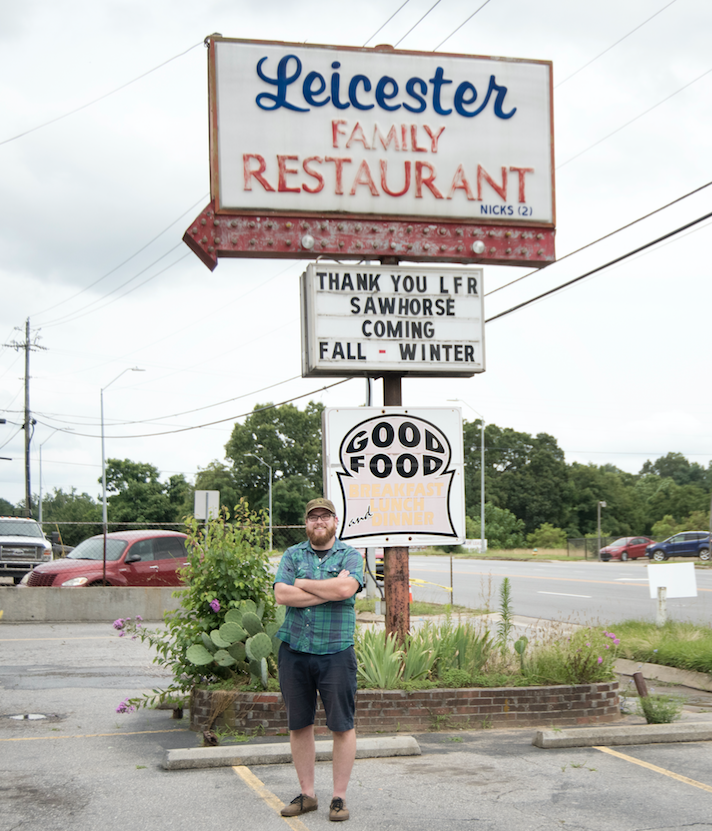When Dan Silo is in the kitchen, he isn’t just making food; he’s channeling something.
“Northern, French-Canadian food — it’s really just country grandma cooking,” he says, trying to explain why a chef who has worked everywhere from Animal in Los Angeles to Sean Brock’s McCrady’s in Charleston, S.C., would focus on Northeastern cuisine.
“It’s really more of an approach to cooking than it is a certain set of dishes,” he says. “There are certainly the staples — poutine and tourtierre and that kind of thing. But for the most part, it’s just about making sparse things work with whatever you can find.”
Silo’s great-grandmother and great-great grandmother both worked as lumber camp cooks in the Adirondack Mountains of northern New York state in the late 1800s and early 1900s. When he took ownership of the Leicester Family Restaurant in June, he did so with the intention of bringing his Northern roots down South, starting with the eatery’s name — Sawhorse.
“It’s kind of a reference to my great-grandmother and my grandfather and our cabin in the Adirondacks; there was always an old sawhorse or several around,” he says.
“Years ago, when I’d just started having the realization that I wanted to open my own restaurant, I was up there and I remember seeing the sawhorse and thinking, ‘That’s it, that is exactly it.’ That image connects me so much to my family and that place, but it’s also about the utilitarian character of what a sawhorse is,” he continues. “It is perfect and efficient and exactly what it needs to be and nothing else.” Much like the food of his people.
Cooking through the chaos
For many Western North Carolina chefs, despite the demands of the restaurant world’s tourism-based economy, having control of a menu isn’t just about doling out froufrou dishes learned at culinary school. For many, it’s less about what they are serving, and more about the food’s origins.
“Most of our recipes are handed down from my mom,” says Suzy Phillips, chef and owner of Gypsy Queen Cuisine. “They are her recipes and her mother’s recipes, passed down generation through generation. There are, of course, new creations, but it comes from a love for her and a love for my culture.”

Born and raised in Lebanon, Phillips’ mother, Salwa Farah, never learned to read or write, was never sent to school, and was, instead, sent to work as a housekeeper cooking in people’s homes. “She really had a hard life from the get-go, from a really poor family,” she says. “She grew up cooking, and that’s all she really knew how to do, because it was all she had ever done.”
For Phillips, who grew up in Lebanon during that country’s civil war, her mother’s cooking is a thread that still binds her to the fabric of her culture and her heritage. “Something about the Lebanese culture, it runs through our veins: We have to cook. Everybody cooks,” she says.
During the war, Phillips and her mother spent time in a shelter, and to keep their minds off of the bombs falling outside, they cooked. “We had a stove in our little apartment in the shelter where we did a lot of fun stuff, as morbid as that sounds,” she says. “The situation we were in, we just focused on food to give us some kind of joy. As Lebanese people, we try to live around the chaos, so when it finally got quiet, we got out of the shelter, and we would go to the farms, and we would go to the butcher, or we fished, or we went hunting.”
When Phillips moved to the U.S. in 1988, she and her mother preserved the memories of their beloved homeland through continuing to prepare its cuisine. And today, Phillips keeps her mother’s memory vibrant through food as well.
“After my mom passed away over three years ago, I remember her when I taste the food. I want to keep it alive, I want to share my story and my culture and my traditions through the food I cook at Gypsy Queen,” she says.
But since her mother could not read or write, none of her recipes were written down. “I used to be able to call her and say, ‘How did you do this?’ But now, I just have to wing it. There are some dishes I still can’t do like she did.”
From the heart
“I really wanted people to know where I’m from and what we eat in Argentina,” says Cecilia Marchesini, chef and owner of Cecilia’s Kitchen in Asheville and La Guinguette in Black Mountain. “People are always like, ‘Where’s the rice and beans?’ We don’t eat rice and beans in Argentina,” she says. “Our main meal is beef, so I try to bring that to my new community here. They don’t know about me, and this is a way to let them know a little bit more of who I am.”
For Marchesini, her connection with food took root many years ago with a family tradition of cooking four- or five-course Sunday feasts with grandparents, aunts and uncles. “That side of my family was Italian, so for us, the big deal was to make homemade pasta,” she says, noting that she usually cooked with her father.
“My mom was a really good cook, and a lot of the recipes I have actually come from her. But she wouldn’t cook because she didn’t want to make the kitchen dirty,” she says with a laugh. “So my dad would say, ‘Let’s send Mom to the movies with her friend, and then we will have the kitchen for ourselves.’ And we would prepare the whole meal, and by the time she would be back, most of the meal would be done, and most of the mess would either already be happening, or we would have cleaned up everything.”
Marchesini grew up in a rural village in central Argentina, cattle farming country where the food was fresh, ripe and relevant. She carried that sense to her restaurants, opening Café Soleil with her now ex-husband, Stephane Diaz, on Lexington Avenue in 2003 (it shuttered in 2005), and later to her other ventures.
Early on, she focused on crepes, which reflected her ex-husband’s French background, but she later also began offering empanadas, savory hand pies that are a traditional food in Argentina. “Not everyone knew what an empanada was, but now, I love to see kids eating a beef empanada with their hands, like we would eat it [in Argentina]. It’s sharing something from my life; these are things I grew up with, and they bring a lot of memories. It’s food from the heart.”
Sawhorse is slated to open this fall at 101 New Leicester Highway. For updates, look for Sawhorse on Facebook.
Gypsy Queen Cuisine Market and Deli is at 807 Patton Ave. For details, visit gypsyqueencuisine.com.
La Guinguette is at 105 Richardson Blvd., Black Mountain, and Cecilia’s Kitchen is at 961 Merrimon Ave. Visit laguinguettecreperie.com or ceciliaskitchen.com for details.



Reading is fundamental.
After reading Homer’s “The Odyssey” is high school,
I developed a taste for Greek and Mediterranean cuisine as half
the novel is devoted to what the sailors chowed down upon once
fighting a cyclops/resisting a siren was completed and they were safely onshore.
I read a book in college about French voyageurs who traveled via canoe to trap and trade
furs in Canada and they sounded like they ate darned well for carrying their kitchen in a birchbark canoe.
My Pappy had a cookbook of Boy Scout recipes over a campfire
published in the mid 1950’s where all the artwork looked like pompadoured
Beaver Cleavers but mmmm for the food.
I almost (not all the way, just almost) wish New Orleans would flood again
so Asheville could ride another wave of Cajun and Creole type eateries owned by
flooded out refugees from The Big Easy.